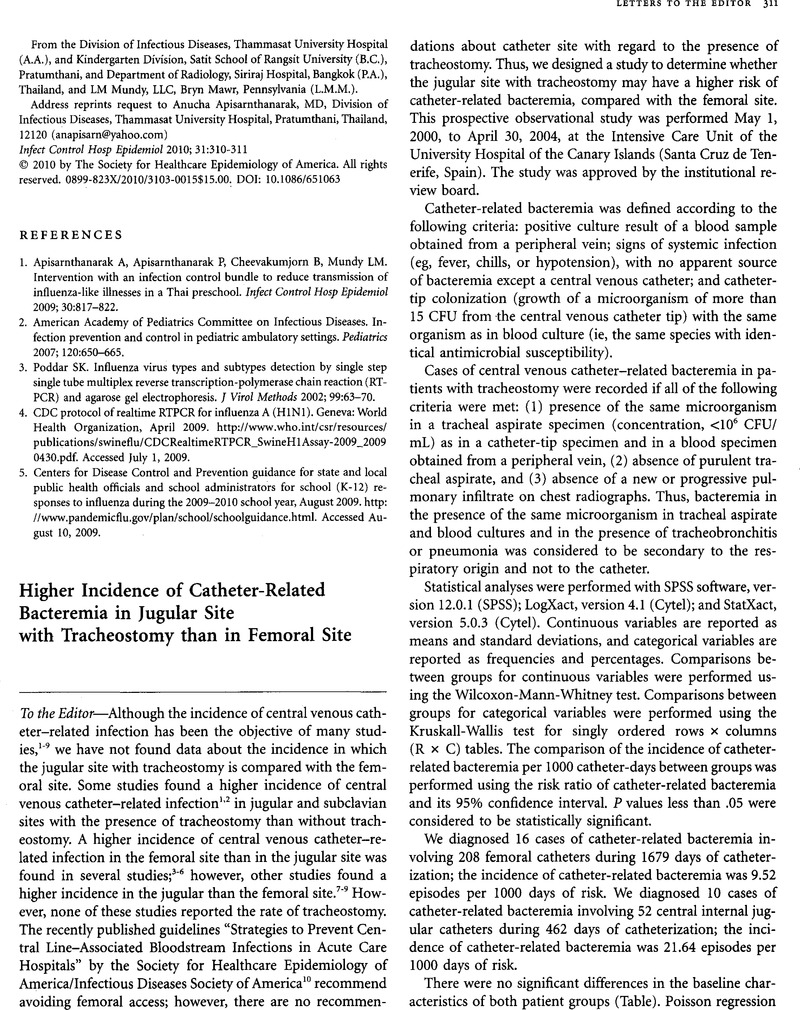Crossref Citations
This article has been cited by the following publications. This list is generated based on data provided by Crossref.
Lorente, L.
2010.
Prevención de la bacteriemia relacionada con catéter intravascular.
Medicina Intensiva,
Vol. 34,
Issue. 9,
p.
577.
Lorente, L.
Jiménez, A.
Martín, M.M.
Palmero, S.
Jiménez, J.J.
and
Mora, M.L.
2011.
Lower incidence of catheter-related bloodstream infection in subclavian venous access in the presence of tracheostomy than in femoral venous access: prospective observational study.
Clinical Microbiology and Infection,
Vol. 17,
Issue. 6,
p.
870.
Chico-Padrón, Rosa Maria
Carrión-García, Laura
Delle-Vedove-Rosales, Lorena
González-Vargas, Carlos S.
Marrero-Perera, Mónica
Medina-Chico, Sergio
Rodríguez-Díaz, Maria P.
Alonso-Díaz, Montserrat
and
Jiménez-Sosa, Alejandro
2011.
Comparative Safety and Costs of Transparent Versus Gauze Wound Dressings in Intravenous Catheterization.
Journal of Nursing Care Quality,
Vol. 26,
Issue. 4,
p.
371.
Lorente, L
Palmero, S
Jiménez, JJ
Roca, I
Naranjo, C
Castedo, J
Huidobro, S
Lorenzo, L
Iribarren, JL
and
Mora, ML
2011.
Higher incidence of catheter-related bloodstream infection in femoral venous access than in subclavian venous access in the presence of tracheostomy.
Critical Care,
Vol. 15,
Issue. S1,
Demirci, Onur
and
Popovich, Marc
2012.
Anesthesia for Otolaryngologic Surgery.
p.
255.
2012.
Anesthesia for Otolaryngologic Surgery.
p.
245.
Lorente, L.
Lecuona, M.
Ramos, M. J.
Jiménez, A.
Mora, M. L.
and
Sierra, A.
2012.
Rifampicin–miconazole-impregnated catheters save cost in jugular venous sites with tracheostomy.
European Journal of Clinical Microbiology & Infectious Diseases,
Vol. 31,
Issue. 8,
p.
1833.
Lorente, L.
2013.
Prevention of catheter-related infection: which catheter, which access and which insertion technique should be chosen?.
Réanimation,
Vol. 22,
Issue. S2,
p.
409.
Marschall, Jonas
Mermel, Leonard A.
Fakih, Mohamad
Hadaway, Lynn
Kallen, Alexander
O’Grady, Naomi P.
Pettis, Ann Marie
Rupp, Mark E.
Sandora, Thomas
Maragakis, Lisa L.
and
Yokoe, Deborah S.
2014.
Strategies to Prevent Central Line-Associated Bloodstream Infections in Acute Care Hospitals: 2014 Update.
Infection Control,
Vol. 35,
Issue. S2,
p.
S89.
Marschall, Jonas
Mermel, Leonard A.
Fakih, Mohamad
Hadaway, Lynn
Kallen, Alexander
O’Grady, Naomi P.
Pettis, Ann Marie
Rupp, Mark E.
Sandora, Thomas
Maragakis, Lisa L.
and
Yokoe, Deborah S.
2014.
Strategies to Prevent Central Line-Associated Bloodstream Infections in Acute Care Hospitals: 2014 Update.
Infection Control & Hospital Epidemiology,
Vol. 35,
Issue. S2,
p.
S89.
Marschall, Jonas
Mermel, Leonard A.
Fakih, Mohamad
Hadaway, Lynn
Kallen, Alexander
O’Grady, Naomi P.
Pettis, Ann Marie
Rupp, Mark E.
Sandora, Thomas
Maragakis, Lisa L.
and
Yokoe, Deborah S.
2014.
Strategies to Prevent Central Line–Associated Bloodstream Infections in Acute Care Hospitals: 2014 Update.
Infection Control & Hospital Epidemiology,
Vol. 35,
Issue. 7,
p.
753.
Lorente, Leonardo
2015.
The Role of Antimicrobial-Impregnated Catheters on Catheter-Related Bloodstream Infection Prevention.
International Journal of Infection,
Vol. 2,
Issue. 4,
Marik, Paul Ellis
2015.
Evidence-Based Critical Care.
p.
213.
Lorente, Leonardo
2016.
Antimicrobial-impregnated catheters for the prevention of catheter-related bloodstream infections.
World Journal of Critical Care Medicine,
Vol. 5,
Issue. 2,
p.
137.
2017.
Prävention von Infektionen, die von Gefäßkathetern ausgehen.
Bundesgesundheitsblatt - Gesundheitsforschung - Gesundheitsschutz,
Vol. 60,
Issue. 2,
p.
171.
Zhu, Shichao
Kang, Yan
Wang, Wen
Cai, Lin
Sun, Xin
and
Zong, Zhiyong
2019.
The clinical impacts and risk factors for non-central line-associated bloodstream infection in 5046 intensive care unit patients: an observational study based on electronic medical records.
Critical Care,
Vol. 23,
Issue. 1,
Tranà, Cristian
2021.
Infections in Surgery.
p.
89.
AL-Shukri, Rehab Nasser
AL-Rawajfah, Omar M.
Al-Daken, Liala
and
Al-Busaidi, Mujahid
2022.
ICU-acquired central line-associated bloodstream infection and its associated factors in Oman.
American Journal of Infection Control,
Vol. 50,
Issue. 9,
p.
1026.
Buetti, Niccolò
Marschall, Jonas
Drees, Marci
Fakih, Mohamad G.
Hadaway, Lynn
Maragakis, Lisa L.
Monsees, Elizabeth
Novosad, Shannon
O’Grady, Naomi P.
Rupp, Mark E.
Wolf, Joshua
Yokoe, Deborah
and
Mermel, Leonard A.
2022.
Strategies to prevent central line-associated bloodstream infections in acute-care hospitals: 2022 Update.
Infection Control & Hospital Epidemiology,
Vol. 43,
Issue. 5,
p.
553.
Rosenthal, Victor Daniel
Yin, Ruijie
Myatra, Sheila Nainan
Memish, Ziad A.
Rodrigues, Camilla
Kharbanda, Mohit
Valderrama-Beltran, Sandra Liliana
Mehta, Yatin
Afeef Al-Ruzzieh, Majeda
Aguirre-Avalos, Guadalupe
Guclu, Ertugrul
Gan, Chin Seng
Jiménez Alvarez, Luisa Fernanda
Chawla, Rajesh
Hlinkova, Sona
Arjun, Rajalakshmi
Agha, Hala Mounir
Zuniga Chavarria, Maria Adelia
Davaadagva, Narangarav
Lai, Yin Hoong
Gomez, Katherine
Aguilar-de-Moros, Daisy
Tai, Chian-Wern
Sassoe Gonzalez, Alejandro
Aguilar Moreno, Lina Alejandra
Sandhu, Kavita
Janc, Jarosław
Aleman Bocanegra, Mary Cruz
Yildizdas, Dincer
Cano Medina, Yuliana Andrea
Villegas Mota, Maria Isabel
Omar, Abeer Aly
Duszynska, Wieslawa
El-Kholy, Amani Ali
Alkhawaja, Safaa Abdulaziz
Florin, George Horhat
Medeiros, Eduardo Alexandrino
Tao, Lili
Tumu, Nellie
Elanbya, May Gamar
Dongol, Reshma
Mioljević, Vesna
Raka, Lul
Dueñas, Lourdes
Carreazo, Nilton Yhuri
Dendane, Tarek
Ikram, Aamer
Kardas, Tala
Petrov, Michael M.
Bouziri, Asma
Viet-Hung, Nguyen
Belskiy, Vladislav
Elahi, Naheed
Salgado, Estuardo
and
Jin, Zhilin
2023.
Multinational prospective study of incidence and risk factors for central-line–associated bloodstream infections in 728 intensive care units of 41 Asian, African, Eastern European, Latin American, and Middle Eastern countries over 24 years.
Infection Control & Hospital Epidemiology,
Vol. 44,
Issue. 11,
p.
1737.



